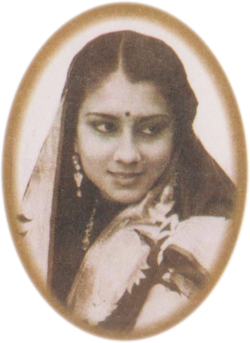Vijaya Raje Scindia
This article needs additional citations for verification. (February 2019) |
| Vijaya Raje Scindia | |||||
|---|---|---|---|---|---|
 Scindia on 2001 cover by India Post | |||||
| Rajmata of Gwalior | |||||
| Tenure | 1970–1998 | ||||
| Born | 12 October 1919 Sagar, Central Provinces and Berar, British Raj | ||||
| Died | 25 January 2001 (aged 81) New Delhi, India | ||||
| Spouse | HH Maharaja Jivajirao Scindia | ||||
| Issue | Usha Raje Madhavrao Scindia Vasundhara Raje Yashodhara Raje | ||||
| |||||
| House | Gwalior, India | ||||
| Father | Thakur Mahendra Singh | ||||
| Mother | Chuda Devashwari Devi | ||||
| Religion | Hinduism | ||||
Vijaya Raje Scindia (12 October 1919 – 25 January 2001), born Lekha Divyeshwari Devi and known popularly as the Rajmata of Gwalior, was a prominent Indian political personality. In the days of the British Raj, as consort of the last ruling Maharaja of Gwalior, Jivajirao Scindia, she ranked among the highest royal figures of the land. In later life, she became a politician of considerable influence and was elected repeatedly to both houses of the Indian parliament. She was a member of the Bharatiya Janata Party.
Early years[edit | edit source]
Vijaya Raje Scindia was born in 1919 at Sagar in present-day Madhya Pradesh, the eldest child of Thakur Mahendra Singh of Kotla State (U.P.), a government officer, by his second wife, Chuda Devashwari Devi.[citation needed] She was named Lekha Divyeshwari Devi at birth. Her father was a deputy collector in the provincial administration. Her mother was the daughter of former Commander-in-chief of the Nepalese Army Commanding-General Raja Khadga Shamsher Jang Bahadur Rana, the nephew of founder of Rana dynasty of Nepal, Jang Bahadur Kunwar Rana. She died at Vijaya Raje's birth. Her brother is Dhyanendra Singh, husband of Maya Singh.[1]
Personal life[edit | edit source]
In February 1941,[2] at the age of 22, Lekha was married to Jivajirao Scindia, Maharaja of Gwalior, one of the largest, richest and highest-ranking princely states in India.
Politics[edit | edit source]
Vijayaraje was initiated into electoral politics in 1957 when she contested and won the Guna Lok Sabha seat in Madhya Pradesh on a Congress ticket. Five years later, she won on a Congress ticket from Gwalior. Later, she quit the Congress and won the Guna seat in 1967 on Swatantra Party's ticket. She soon joined Bharatiya Jan Sangh and resigned from Lok Sabha to take part in state politics. She won the Karera assembly seat in Madhya Pradesh as the Jan Sangh candidate in 1967 and plunged headlong into state politics. Jan Sangh defied the Indira-wave in the 1971 Lok Sabha polls to win 3 seats in Gwalior region – Vijaya Raje Scindia from Bhind, Vajpayee from Gwalior and Madhavrao Scindia from Guna, though he later left the party. Vijayaraje Scindia did not contest Lok Sabha elections in 1977 and 1984 and lost to Indira Gandhi in Rae Bareli in 1980. In 1989, she won from Guna as member of Bharatiya Janata Party (BJP), and retained the seat in 1991, 1996 and 1998. She did not contest the elections in 1999 due to old age. She was jailed by Indira Gandhi during the Emergency, ultimately sharing a cell with fellow Rajmata and MP, Gayatri Devi, in Tihar Jail. In the 1970s, Vijayraje and her son Madhavrao were involved in a public dispute over property. Animosities heightened due to their differing political ideologies.
Vijayaraje came to the forefront of the BJP leadership in 1980 when she was made one of its vice-presidents. She played a key role in popularizing the party's Ram Janmabhoomi movement and was considered a hardliner. Following the demolition of the Babri Masjid in December 1992, she had declared that "she could now die without any regret, for she had seen her dream come true."[3] She remained a BJP vice-president until 1998 when she stepped down on health grounds and quit electoral politics. She died in January 2001.
Ancestry[edit | edit source]
| Ancestors of Vijaya Raje Scindia | |||||||||||||||||||||||||||||||||||||||||||||||||||||||||||||||||||||||||||||||||||||||||||||||||||||||||||||||||||||||||||||||||||||||||||||||||||||||||||||||||||||||||||||||||||||||||||||||||||||||||||||||||||||||||||||||||||||||||||||||||||||||||
|---|---|---|---|---|---|---|---|---|---|---|---|---|---|---|---|---|---|---|---|---|---|---|---|---|---|---|---|---|---|---|---|---|---|---|---|---|---|---|---|---|---|---|---|---|---|---|---|---|---|---|---|---|---|---|---|---|---|---|---|---|---|---|---|---|---|---|---|---|---|---|---|---|---|---|---|---|---|---|---|---|---|---|---|---|---|---|---|---|---|---|---|---|---|---|---|---|---|---|---|---|---|---|---|---|---|---|---|---|---|---|---|---|---|---|---|---|---|---|---|---|---|---|---|---|---|---|---|---|---|---|---|---|---|---|---|---|---|---|---|---|---|---|---|---|---|---|---|---|---|---|---|---|---|---|---|---|---|---|---|---|---|---|---|---|---|---|---|---|---|---|---|---|---|---|---|---|---|---|---|---|---|---|---|---|---|---|---|---|---|---|---|---|---|---|---|---|---|---|---|---|---|---|---|---|---|---|---|---|---|---|---|---|---|---|---|---|---|---|---|---|---|---|---|---|---|---|---|---|---|---|---|---|---|---|---|---|---|---|---|---|---|---|---|---|---|---|---|---|---|
| |||||||||||||||||||||||||||||||||||||||||||||||||||||||||||||||||||||||||||||||||||||||||||||||||||||||||||||||||||||||||||||||||||||||||||||||||||||||||||||||||||||||||||||||||||||||||||||||||||||||||||||||||||||||||||||||||||||||||||||||||||||||||
References[edit | edit source]
- ↑ "The Theory Of Relativity". Outlook India. 30 November 1998. Archived from the original on 9 February 2011.
- ↑ Reed, Stanley (1950). The Indian And Pakistan Year Book And Who's Who 1950. Bennett Coleman and Co. Ltd. p. 684. Retrieved 22 February 2018.
- ↑ "December 6, 1992, a memoir". Rediff.com. 5 December 1997. Retrieved 2 November 2018.
Further reading[edit | edit source]
- Scindia, Vijayaraje, with Malgonkar, Manohar. The Last Maharani of Gwalior: An Autobiography, State University of New York Press, Albany (1987).
- Brief biography
- From the Tribune newspaper
- Pages using infobox royalty with unknown parameters
- Articles with unsourced statements from June 2020
- 1919 births
- 2001 deaths
- University of Lucknow alumni
- Bharatiya Janata Party politicians from Madhya Pradesh
- Scindia dynasty of Gwalior
- Women in Madhya Pradesh politics
- Queen mothers
- Lok Sabha members from Madhya Pradesh
- 2nd Lok Sabha members
- 3rd Lok Sabha members
- 4th Lok Sabha members
- 5th Lok Sabha members
- 9th Lok Sabha members
- 10th Lok Sabha members
- 11th Lok Sabha members
- 12th Lok Sabha members
- People from Sagar, Madhya Pradesh
- Indian National Congress politicians from Madhya Pradesh
- Swatantra Party politicians
- Indians imprisoned during the Emergency (India)
- Indian female royalty
- Bharatiya Jana Sangh politicians
- People from Guna district
- Leaders of the Opposition in Madhya Pradesh
- 20th-century Indian women politicians
- 20th-century Indian politicians
- Rajya Sabha members from Madhya Pradesh
- People from Bhind district
- Indian people of Nepalese descent
- Women members of the Lok Sabha
- Women members of the Rajya Sabha
